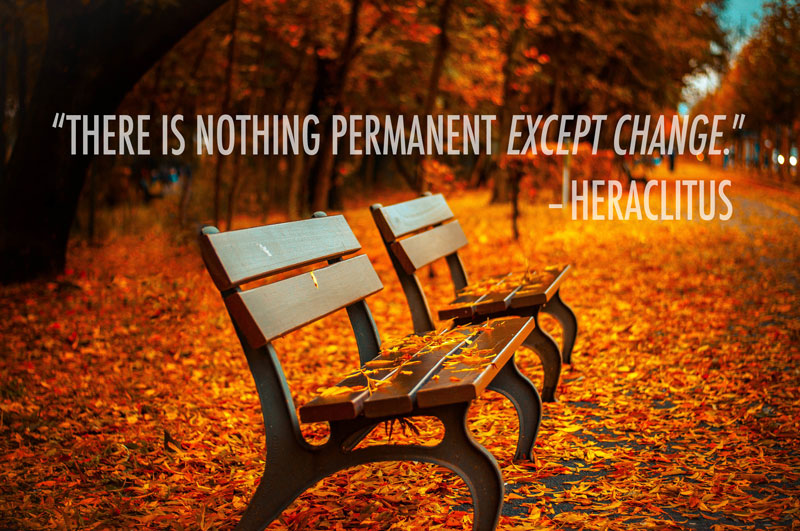“There is nothing permanent except change.” – Heraclitus
Change and transition are at the core of my consulting and coaching work with organizations and individuals. I find myself attracted to this constant movement of life. Even when things appear to be steady, they’re continually evolving and becoming. Rather than resist, why not grab hold of that energy and proactively shape what’s becoming? Easier said than done, right?
What I have found is that change – the specific event itself – is not the greatest challenge, although at first it may appear to be. The toughest part is dealing with what comes as a result of that event, the dynamic and complex human elements of transition. It’s not easy letting go of what we’re comfortable with and leaping into the unknown. It can be a place of great uncertainty and trepidation. Makes you want to jump right in, doesn’t it?
Whether you’re the type that repels change or embraces it, below are a few ideas for how to make it a bit more manageable.
1. Make small steps or break up large-scale changes into more manageable increments.
2. Mentally link changes to established daily rituals. This can make changes like beginning a new habit, starting a new job, or adapting to a new home happen with greater ease.
3. Stay flexible, adaptable and ‘go with the flow.’ It can help you accept change instead of resisting it.
4. Look for the good that change brings. An illness, a broken relationship, or the loss of a promotion or job can seem like the end of the world, yet often they’re also gifts in disguise.
5. Reflect on your greatest learnings through the process and apply to future situations.
6. Be prepared for the unexpected during change and transition. While it’s impossible to know everything that will happen in advance, anticipating certain elements will help make the situation less overwhelming.
7. Remember that you’re not alone. Writing or talking about your circumstance with a colleague or friend can give you a sense of relief while helping you navigate through a challenging period.
8. Give yourself time to accept changes that you face, recognizing that you may need time to adjust to your new situation.
9. No matter how large or difficult a change is, you will eventually adapt to your new circumstances. The new that it brings will eventually weave itself into the right places in your life.
10. If you’re trying to change a pattern of behavior or navigate your way through a significant change, don’t assume that it has to be easy. Expressing your feelings and emotions during a period of change is natural. Then again, don’t assume that making a change needs to be hard. Sometimes, changes are meant to be that easy.
“We cannot change anything until we accept it. Condemnation does not liberate, it oppresses.” – Carl Jung
_________
Jeanie is President of Raven Consulting Group, a business she founded that focuses on organizational change and leadership development in the nonprofit sector. She is a senior consultant for TransitionGuides, a national firm working with nonprofit clients to lead efforts in sustainability and succession planning, executive transition and search. Additionally, Jeanie serves as adjunct faculty for the Center for Creative Leadership, a top-ranked, global provider of executive leadership education.


Recent Comments